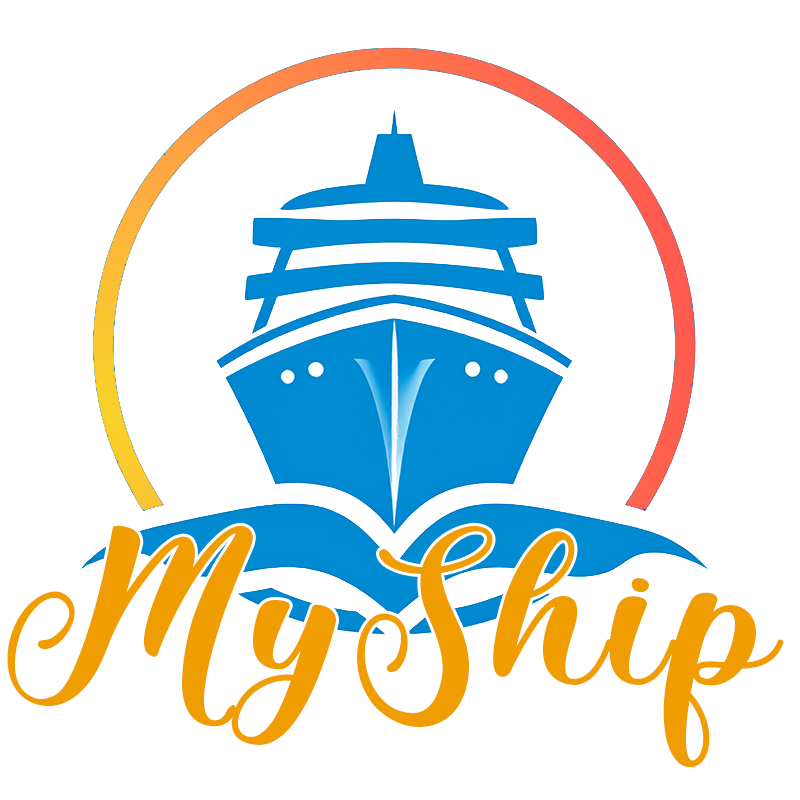The Paper Sea
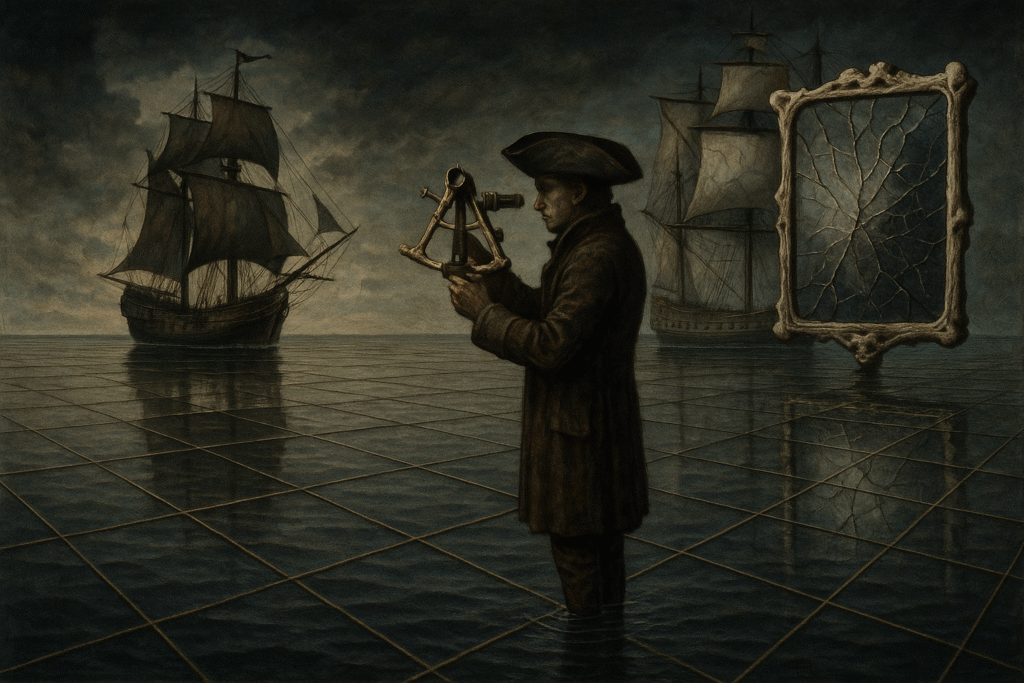
By noon the water turned the color of old vellum. Waves flattened into creases; crosscurrents bled like spilled ink. The sky lost depth, as if a careless hand had rubbed out its horizon with a thumb.
The star-compass shifted tune. The mercury didn’t form lanes; it drew gridlines—skewed meridians that met at no sensible pole. Finn’s palm brightened in answer, his lines rearranging themselves into a scale bar he didn’t know he could read.
“Cartographer’s Wake,” Mireya said, too practical to make it a superstition and too wise to call it anything else. “Hold to true things.”
“Name three,” Silas said.
“Keel, crew, and cost,” she answered, and Briggs grunted approval.
Astern, the Santa Lucía stepped into the same false chart, her cracked mirror bandaged in brass. On her foremast, royal surveyors hoisted white kites with inked eyes; they floated ahead to pin routes that didn’t exist until men said they did.
“Hunters with pencils,” Briggs muttered.
“Then we’ll steal the eraser,” Silas said.
The Surveyor
They found him where the gridlines knotted, a man-shaped figure standing on the water as if it had signed for the privilege. His coat was cut like a King’s officer’s but stained with lampblack. His sextant was bone and obsidian.
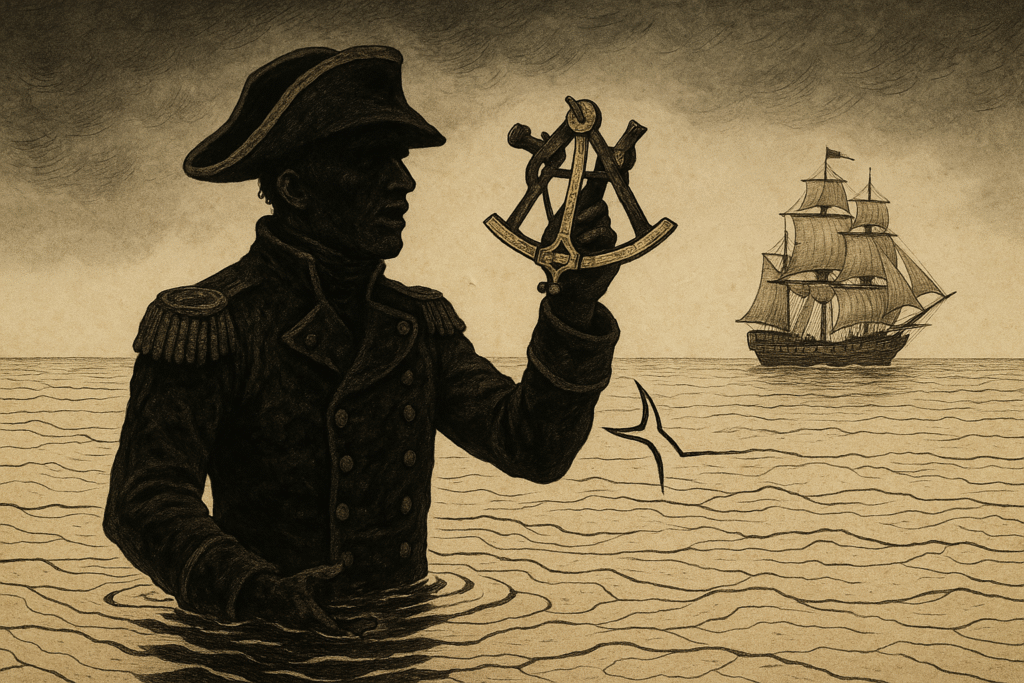
He looked at the brig and the boy and the brass disk.
“You bring a writer,” he said, meaning Finn, as if that were obvious. “And a book that thinks it’s a compass.” His voice had the dry rasp of vellum turned too often.
“What do you take for passage?” Silas asked, polite as a thief on a church step.
“A name you answer to,” the Surveyor said. “Erase it where the sea keeps books. In return, you may erase what you cannot outrun.”
Finn’s mouth went desert-dry. Names were anchors; everyone aboard knew it.
Silas’s good eye stayed steady. “I have more than one,” he said lightly. “Let me choose an old shell I don’t wear.”
The Surveyor’s smile didn’t move his eyes. “Not a hat. A head. Choose careless, and your crew will forget how to shout you from sleep.”
Briggs’s jaw squared. Mireya’s hand found Finn’s shoulder without asking.
Finn spoke before courage could argue. “Take O’Malley,” he said. “Keep Finn.”
The deck’s silence was sharp and clean. Mireya’s fingers pressed once in warning and once in pride.
The Surveyor weighed him like a measure. “A family is a harbor,” he said. “You’ll sail farther without it. Not safer. But farther.” He raised the sextant. “Paid.”
Finn felt a tug in his ribs—as if a line had been cut free from a piling deep inside him. It didn’t hurt. It changed him the way taking in a reef changes a sail: same cloth, less drag.
Briggs swore softly. Mireya let breath out like a held note. Silas inclined his head to the Surveyor. “The eraser?”
The man in lampblack pointed with the sextant’s cracked limb. “There,” he said. “The Unwake. Write your wake through it; what hunts you will follow a line that no longer exists.”
Inkwhales and Chart-Kites
They steered for a patch of water that looked like a smudge rubbed thin. Inkwhales breached nearby—sleek backs that shed black in sheets; where it fell, the grid vanished and reappeared a beat later, wrong. Overhead, the Spanish chart-kites dipped and shivered, re-inking paths with cruel precision.
“Those kites are sewing our choices shut,” Mireya said.
“Then open a seam.” Silas tipped his hat toward the main. “Finn?”
Finn’s palm thrummed with a knot he didn’t know yesterday. Not the sheet bend; something fixed and fast: a bowline—a loop that holds without choking. “I can tie us a loop in the wake,” he said, surprised to hear it.
“Do it,” Silas said, as if that were rope and not sorcery.
Mireya bled a thumb of lampblack from the chest; the serpent lock drank a taste and sighed. The star-compass mercury pulled itself into a clean oval that drifted off their quarter: the wake-loop. Finn set his palm on the rail and tied the air with his will the way a sailor ties a line: quick, confident, exact.
Their wake bent and came back on itself, a loop laid on the water like a drawn noose.
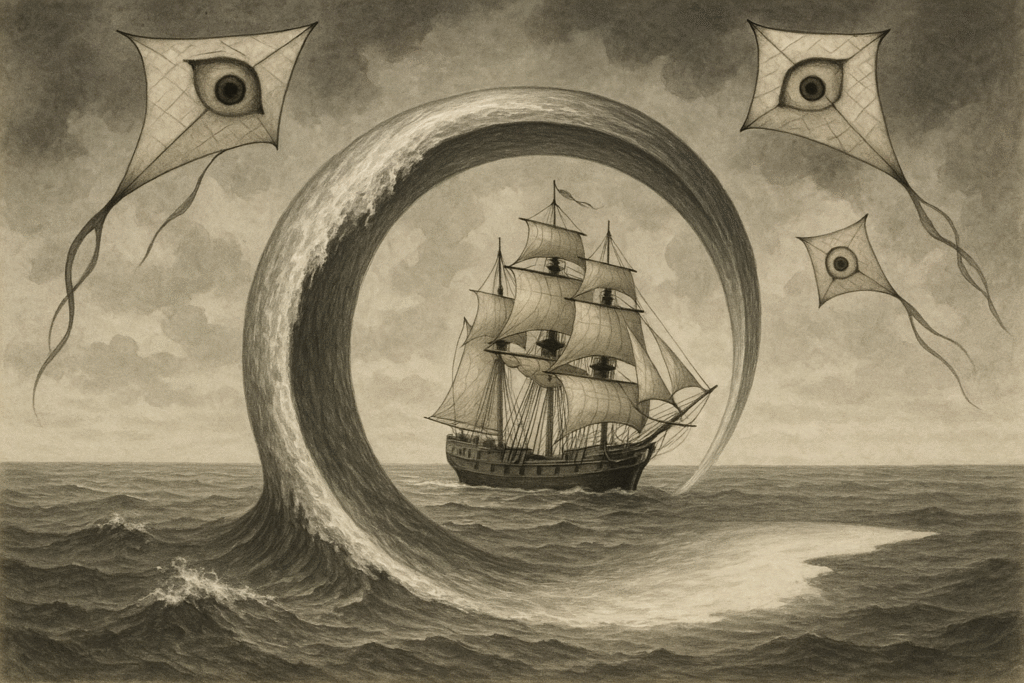
The chart-kites dove to fix it. Ink rained from their eyes. The Unwake took the ink and made nothing of it—white silence that ate marks, a bite in a map.
“Now,” Silas said.
Hayes carved hard to starboard; the Crimson Horizon leapt through its own loop and out the back of a path that wasn’t there anymore. Astern, the Santa Lucía committed to the inked line—and fell through a seam into a lane that ended where no water remembered it should continue.
For a bright, cruel minute the frigate hunted a missing thing.
Briggs whooped once and then caught it, folding joy down to the size of a charm. Mireya smiled with only half her mouth. “Don’t count it yet,” she said. “Surveyors are good at finding second drafts.”
The Unnaming
The Surveyor had not lied. The Unwake was a blank wound. Sailing into it felt like stepping on a stair you swear isn’t there.
“Hold to true things,” Mireya said again, quieter. “Keel, crew, cost.”
The brig’s nameboard creaked in a wind that didn’t exist. Letters wanted to unread themselves.
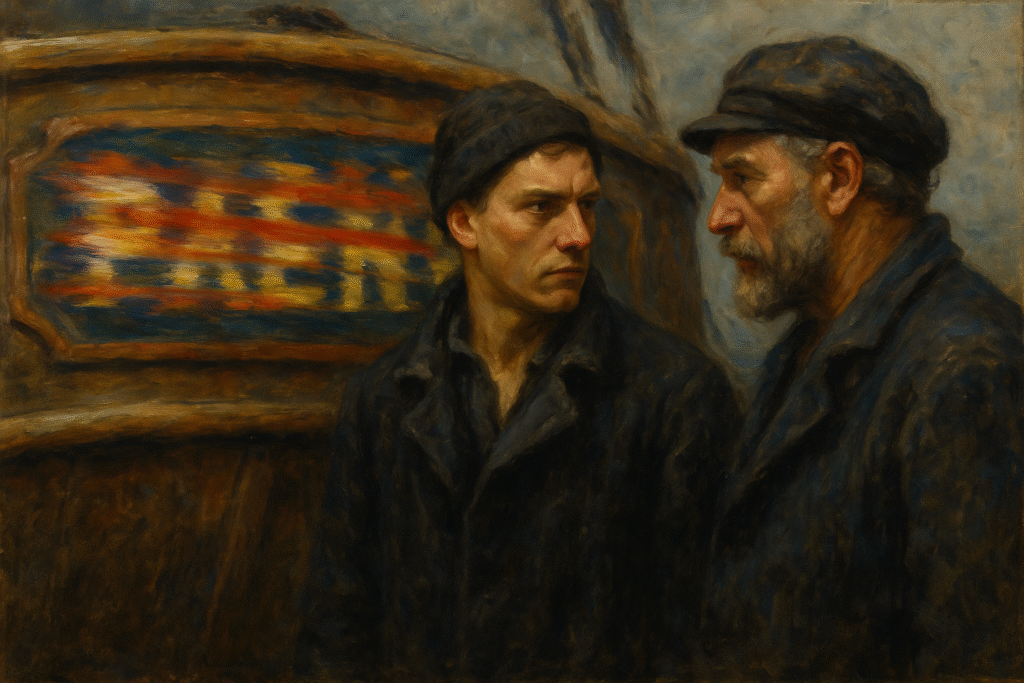
Silas removed his hat as if before an altar. “We’ll cross unnamed,” he said. “Cover colors. Strike the banner.”
Briggs’s hands were sure and sad on the halyards. Canvas whispered down. The proud CRIMSON HORIZON at the stern blurred like damp ink.
“Don’t look at it,” Mireya told the crew. “Look at each other.”
They did. Men and women counted faces the way you count barrels: to prove the ship is real because the people are.
Finn glanced once at the nameboard and felt the world try to forget it. He looked away and held a true thing: the feel of the rail under salt-wet hands.
They slid across the Unwake in a hush that made the Nine Bells seem noisy. On the far side, wind had bones again. The letters at the stern shivered, considered, and remembered themselves.
Finn exhaled a laugh that was almost a sob. Mireya let herself smile all the way.
Valdés’ Counter-stroke
A cannon boomed—not at them, over them. A shot arced and burst in the air like a black flower. Ash fell in a fine veil and clung to the Unwake’s wound, sketching lines where none should be.
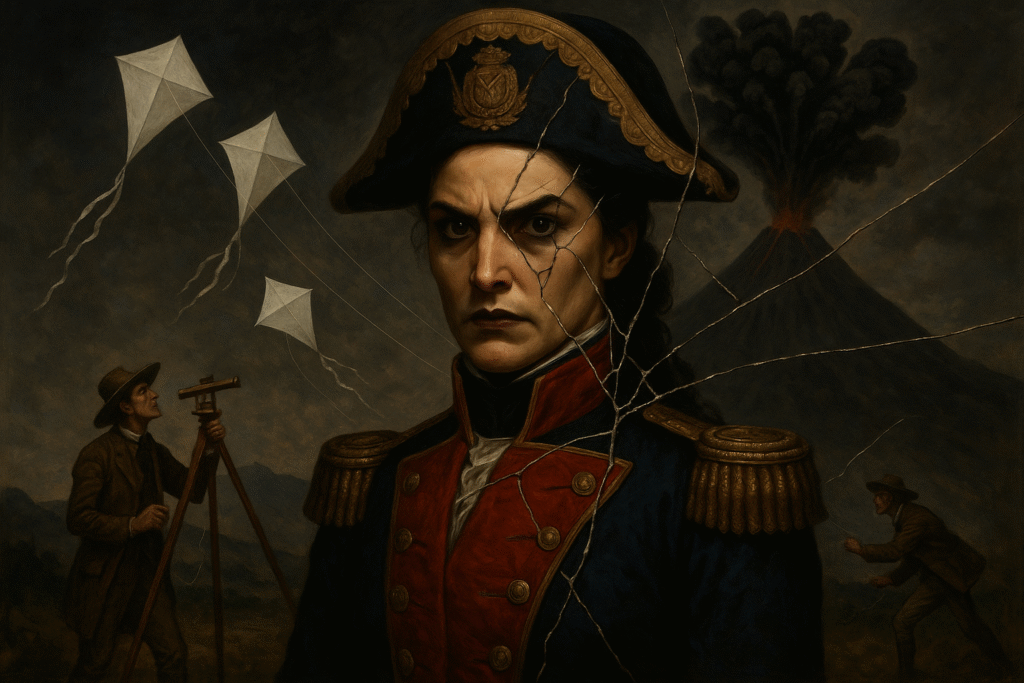
On the Spanish quarterdeck, Capitana Inés Valdés held the cracked mirror with both hands. Her surveyors flung charcoal buoys that floated and bled ink. The Unwake healed slower under the smear.
“She’s drawing the sea back into being,” Mireya said, begrudging admiration in the math of her voice.
Silas’s jaw went a degree harder. “Then we answer in kind.”
He flipped the star-compass gimbal lock. The mercury stilled, then surged, extruding a thin plume that hung over the brig like a base line on a chart. “Write us a soundings song,” he told the crew. “If the Wake believes anything, it believes a good measure.”
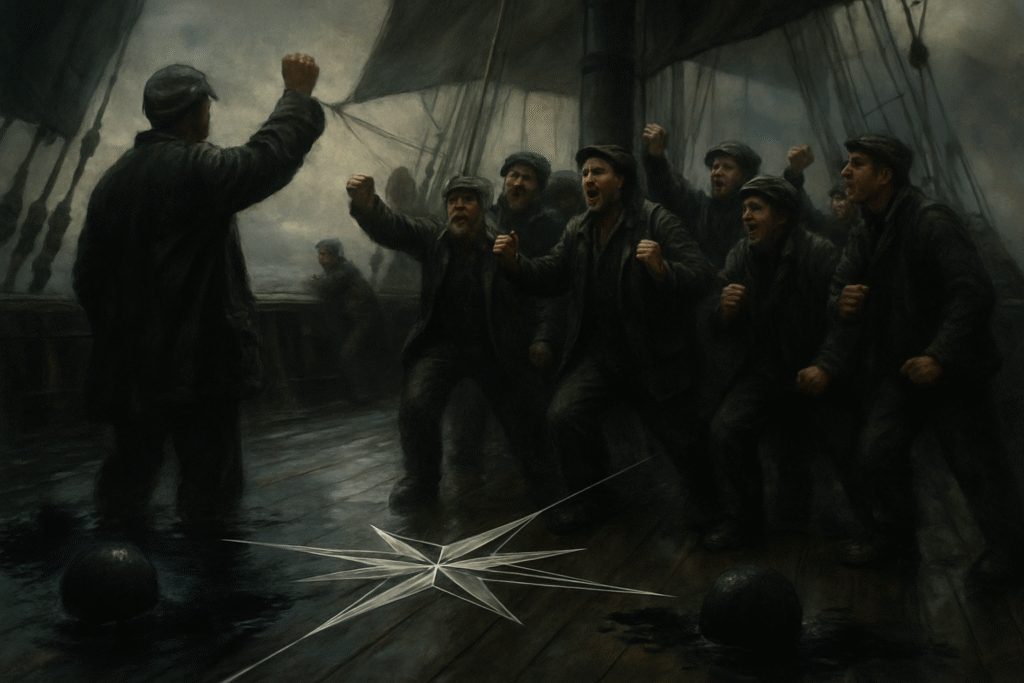
Briggs started a call used for lead-and-line:
“By the mark—”
“—Seven!” the deck answered, voices lining up like tick marks.
“And by the deep—”
“—Nine!”
They sang the sea into measures. The Wake liked it. The charcoal buoys bobbed and blurred; the black flower ash ran like tears. Valdés pinched the mirror and set her jaw and refused to be out-stubborned.
She lifted her chin and spoke a single word across a distance that had stopped being sensible. Finn didn’t know the language; he knew the shape of it: a name. She had paid the Surveyor too.
The frigate shook as if shedding a skin. She came on faster.
“Your move,” Mireya said.
The Bowline on the World
Finn’s palm burned, not pain—instruction. The bowline-knot etched there brightened until it felt like a loop you could step through.
“I can fix one thing,” he said, “and the rest’ll have to move around it.”
“Fix what?” Silas asked, trusting him where a lesser captain would have pressed.
“Our course,” Finn said. “A loop we pass through only once.”
Silas nodded like he’d been waiting for the boy to say it. “Do it.”
Finn set both hands on the rail, closed his eyes, and tied the air again: the rabbit comes out of the hole, goes round the tree, back down the hole—every sailor’s childhood made spell. The star-compass mercury obeyed, sketching a silver gate ahead—simple, perfect.
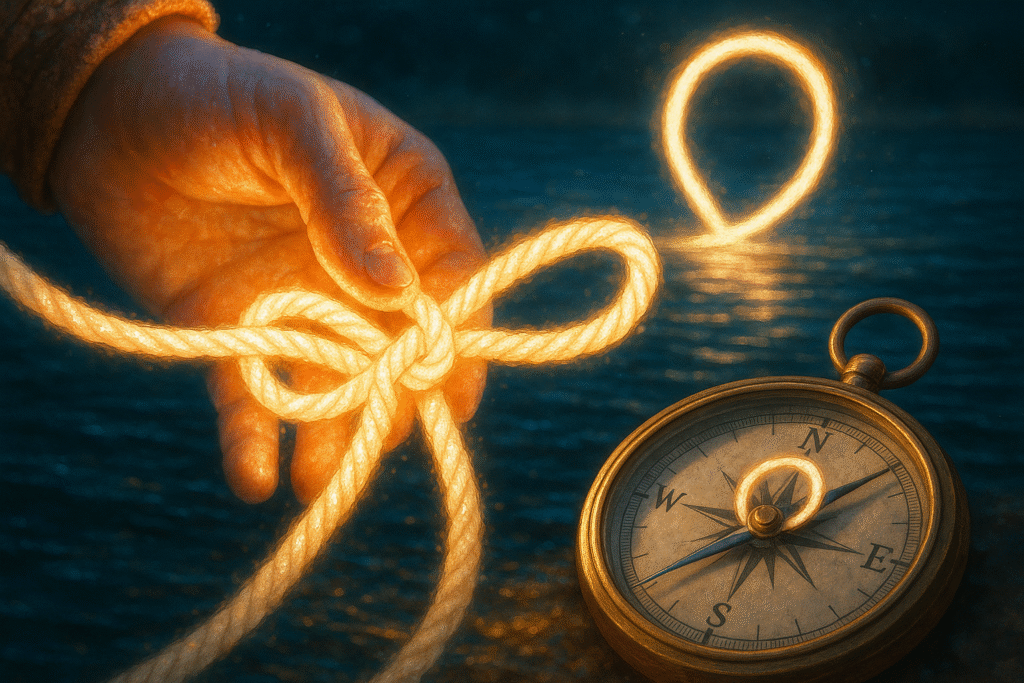
“Helm,” Silas said.
“Straight,” Hayes answered, smiling with his mouth and not his eyes.
They shot the loop. The world agreed to a line they could only take once. The Santa Lucía dived after—and the loop, true to its nature, was already finished. Her bow shouldered nothing; her sails snapped; for a heartbeat the frigate sat between drafts.
“That buys a bell,” Mireya said. “Maybe two.”
“Then spend them,” Silas said. “Hard to port. We’ll lay our own coast.”
They sketched a shoreline where no chart had had the nerve—a fingery fringe of shoals and a bay shaped like a smile with one tooth missing. The Wake kept it, pleased to be asked.
Their brig slid into the brand-new water and found shelter behind a reef that had not existed a minute before and would never not exist again.
Astern, the Santa Lucía had to swing wide and give that new truth room.
Cost
It would have been neat to say they paid nothing.
Silas aged a shade—not dramatic, just a decision written around the eyes. Mireya’s braid lost a copper wire, and she didn’t go hunting in her pocket for another. Briggs’s laugh stayed big, but it landed heavier.
Finn went to the stern and read the re-coalesced letters:
CRIMSON HORIZON
He tried his name aloud, quiet. “Finn.” It held. “O’Mal—” The second half wouldn’t come. Not grief—physics.
“Still you,” Mireya said, appearing with a mug that steamed like forgiveness. “Less drag.”
He nodded and chose to believe her.
New Coast, Old Wolf
They anchored in their own invented bay under a ridge of chalk-white stone that had the manners of cliffs and the memory of paper. The star-compass ticked a lazy satisfaction. The serpent-locked chest was warm as a animal sleeping.
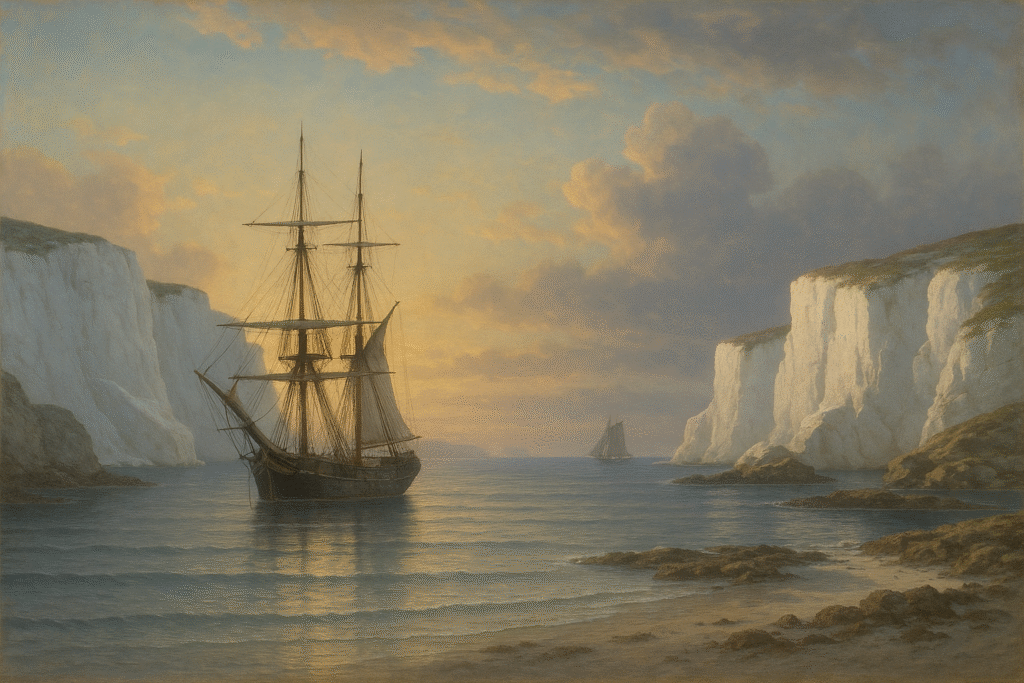
On the horizon, the Santa Lucía hove to and watched. Valdés stood sharp as a cut on her quarterdeck, mirror veined, surveyors quiet. She raised a hand—not parley, not threat. Acknowledgment.
Silas raised his hat the same precise inch. Next time lived between them like a rigged line.
Briggs set the night watches. Mireya drew the new bay on a scrap with a stub of graphite and smiled when her hand didn’t shake. Hayes ran a thumb along a nick in the wheel and didn’t sand it out. Finn fell asleep with his palm on the chest and dreamed of coasts deciding to be brave.
At dawn the chest woke him with a click like a clock agreeing with itself. The serpent lock turned its head toward the east. The mercury wrote two words no chart keeps long:
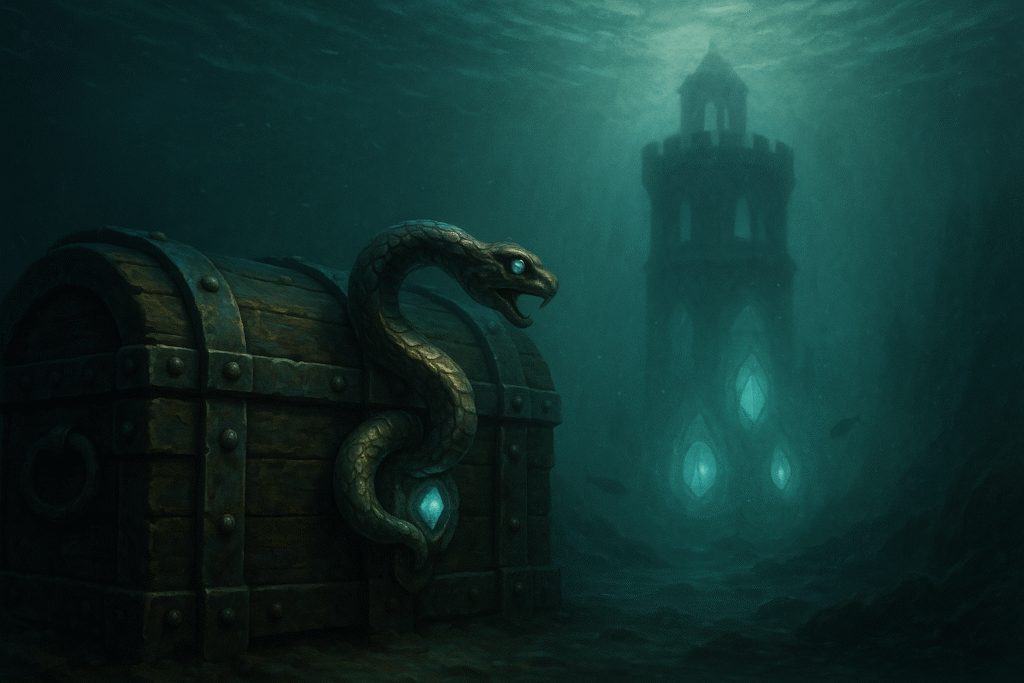
Drowned Observatory.
Silas looked at the same word and let out a breath that might have been a laugh if anyone else had been listening. “Lessons,” he said. “And lenses.”
Out beyond their newly written reef, the Santa Lucía made sail.
“Keel, crew, cost,” Mireya said. “Add time and we have our four.”
“Add stubborn and we have five,” Briggs said.
Finn flexed his hand. The bowline faded to a memory and a habit. “Set a course,” he said, and didn’t bother to name the wind.
The Crimson Horizon eased out of her new harbor and pointed her black knife of a bow toward a place the sea once forgot and would remember them for finding.
—To be continued—
